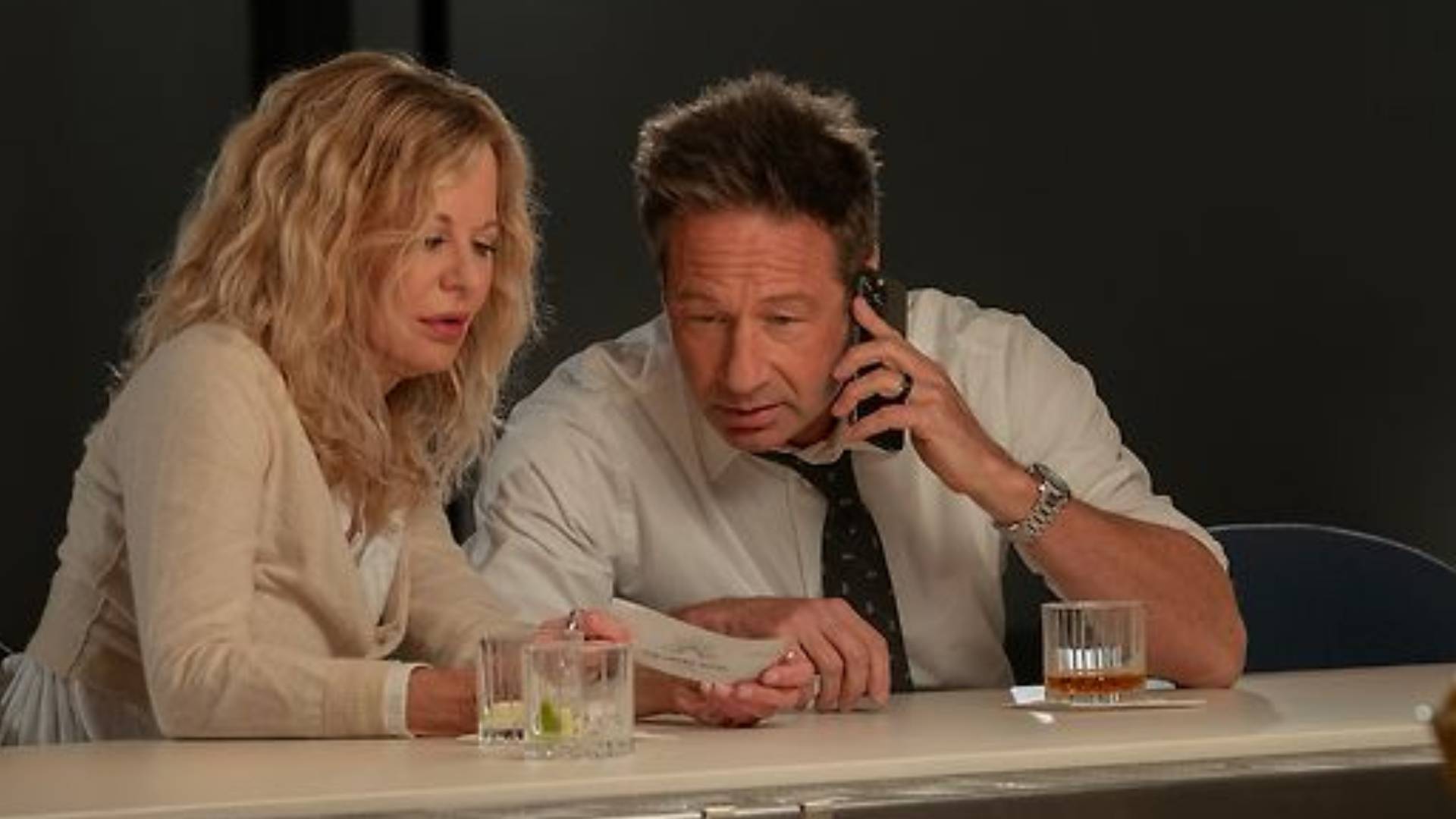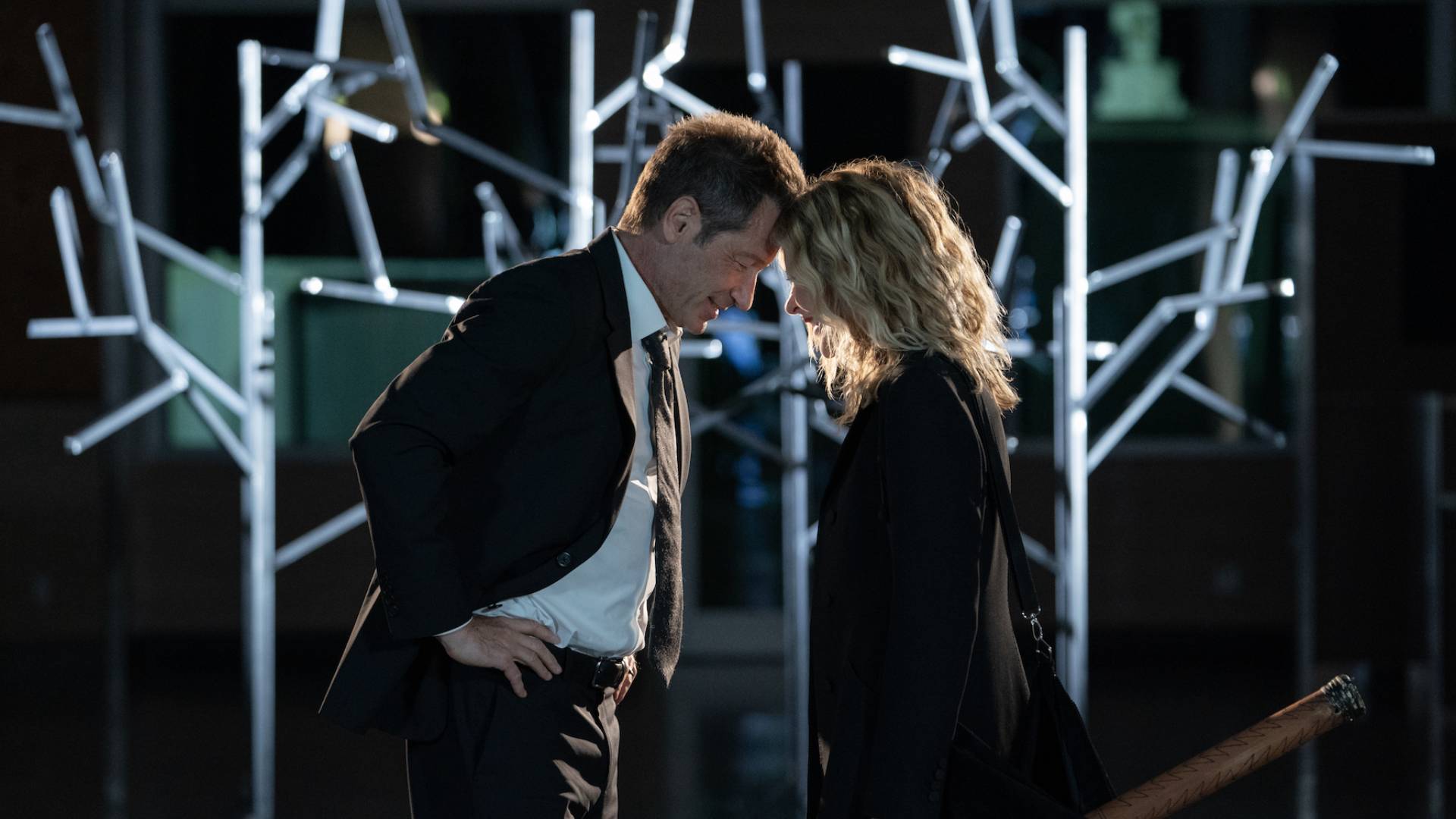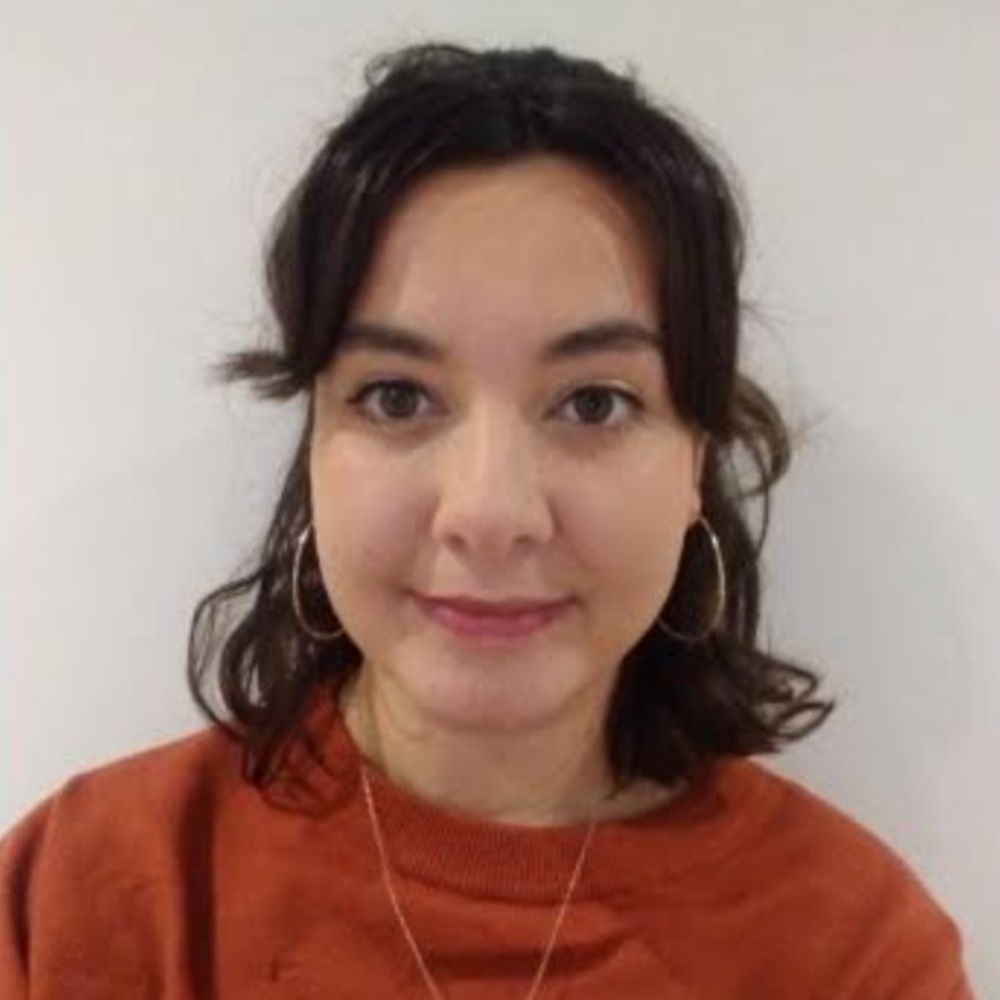Meg Ryan and David Duchovny on returning to rom-coms and paying homage to When Harry Met Sally director
Exclusive: What Happens Later stars Meg Ryan and David Duchovny talk filming in airports, lost connections, and magic realism

A rom-com, Meg Ryan, and an airport meet-cute? What Happens Later – which Ryan also directs and co-writes – features a fair few elements guaranteed to pique the interest of fans of the genre. However, don’t expect a rehash of Ryan’s plethora of early hits, as this film takes a more meditative and emotional tone than you might expect.
It follows two former lovers as they reunite 25 years after a traumatic event pulled them apart and a freak storm lands them stranded in the same airport. Ryan’s Willa and David Duchovny’s Bill soon find that life has taken them in very different directions as they reflect on their past and present. Elements of magical realism weave into the story of lost love, which Ryan tells GamesRadar+ came to her at the perfect time.
We speak below about the challenges that came with filming such a personal drama on a tight budget, how post-pandemic art has changed, and why it was important for Ryan to dedicate the film to her When Harry Met Sally… director and close friend Nora Ephron. Our conversation has been edited for length and clarity.
Meg, before What Happens Later, you had a bit of a break from films. Why was this the right project to come back to?
Meg Ryan: Really, it was for me a lot about the timing of it. You know, it just came to me during COVID, during lockdown, and it was essentially a story about two people kind of locked down. When it first came to me, we all wondered, ‘Should COVID be a part of it?’ I just thought it was an interesting idea, 'What if you were stuck with someone and you had all of these unresolved issues, how would that play out?' So the framing of COVID and then [there was] the fact that I had time to write and time [when] there's no pressure of getting anything on the page. It was just sort of these ruminations at five in the morning, pulling the script apart, putting it back together again.
And David, it's been quite a while since you've tackled a romantic comedy, what was it that drew you to this role?
David Duchovny: Oh, I like that space a lot, and Meg is the best in that space. I couldn't believe my good fortune when it came my way. It was a very easy decision for me to make. I mean, listening to Meg talk about it being a COVID project is interesting to me as well, because I guess I never really put that together. During the lockdown, people were trying to figure out how we were going to make movies. This is one with two people and nobody else has a speaking role, nobody else figures into the world.
Bringing all the latest movie news, features, and reviews to your inbox
The genesis of that is interesting to me because it ended up being such a wonderful challenge to make a movie where there were just two people speaking. I think if Meg had gotten the script and COVID wasn't happening, she probably would have felt the pressure to expand it and have other characters. It's interesting to me that that didn't happen, and I'm thankful.
Ryan: That it's true because the feasibility of just doing a movie with two people at that time was just much more possible.
You speak about this coming to you at a time in COVID, but I wanted to ask a bit about it coming out now. Do you think in the time since the pandemic, there’s become more of a need for feel-good films like this?
Ryan: I have been wondering, watching a lot of the movies coming out this year, a lot of the art, and reading things. I still just think culturally and societally, we're still trying to make some sense of what just happened to all of us. Really, this is a story about forgiveness and it's two people who get their facts straight, two people who are willing to take responsibility, and who are willing to apologize. I thought some of COVID was about that, a reckoning if you're by yourself and you're thinking and you're not doing your usual stuff. I remember watching a plane go overhead and going ‘Wow’ or watching the hummingbirds in my garden, and it was just different.

Meg, I also really like the kind of magical realism element of this story as well. There are some fantastical bits to it, did you want to leave it ambiguous in terms of what is real and what isn't when you're making it?
Ryan: That was a really deliberate decision that the environment gets increasingly magical. It's almost like they wake up and time stops. In post-production, we were able to get rid of all the signs to create a liminal space, and the idea of snow at night outside. I thought it was so magical to be inside looking outside at snow at night. I thought that was naturally beautiful and magical. So those were subtle, but very specific, decisions about the entry into magical space. These two people are in an increasingly magical space, the airport talks to them, more and more directly and it changes its attitude for them. I love magical realism and we didn't have a lot of money to do it so it was more about what we took away from the environment.
And David, am I right that you filmed this in a real airport? What were the challenges that came with that?
Duchovny: Well, we filmed half in a real airport and the rest was actually a beautiful museum, which makes the airport in the film the most magical realistic thing that was done. It's like, ‘Wow, that's the most beautiful airport. I've ever seen’. But the 50% that we shot in the real airport had the challenges that you would imagine even though it was a regional airport, so it was small. It would shut down around 9pm and wouldn't open up again until six or seven in the morning so we had to run at night when we could be alone. But if we had to shoot daytime stuff, we had to shoot around people. We had to do long scenes without cuts, weaving in and out of people who had every right to go where they wanted to go in the airport and have every right to take our picture if they wanted to in the middle of the take and things like that. You can't lock down an airport, it's illegal so every time we did one of those long walk and talks that are during the day, those are real people and we're just kind of betting on their good graces.
Ryan: The fact that we had 21 days and a certain amount of dollars to shoot it, you know those are going to be the parameters. So there were two days we had to shoot during the day at the airport, and with the crowds, we knew we couldn't stop and we knew what all the obstacles were going to be. So it necessitated these long walk and talks where it’s just the two characters talking. What's so great, I think, is that we weren't able to cut those up into coverage and we knew we had to get that. So the fact that we don’t cut adds to the tension and adds to the romance.
And just finally, Meg I noticed that this film is dedicated to Nora Ephron. Why was it important for you to have that tribute in there with this film?
Ryan: I did three or four movies with her and it’s just purely gratitude. It was just a thank-you note. She had a love of it, I have a love for it. She was so delighted on the set all the time, she had so much fun and I started to understand that [as I was directing this]. Part of that was that you write something and it's so small and in your head and it entertains you at your desk. Then a hundred people have an opinion about it and actors are invested in it and all of a sudden it has this life that you could just never imagine when it's small and in your own hands, you know? It's so fun and I just didn't know that when I was working with her. I learned that while I was working on this and I just felt like I understood a little bit more about her.
Duchovny: I’ll say this for you Meg, that you are like Nora. I never met her but you always seemed to be having fun on set, even though I'm sure sometimes you weren't, and that's very important. It's very important for the director to set that tone. So, I appreciated that and knowing where it comes from is significant to me.
What Happens Later is out in theaters now. For what else to watch, check out our guides to the best movies of 2023 and the best TV shows of 2023.

I’m the Deputy Entertainment Editor here at GamesRadar+, covering TV and film for the Total Film and SFX sections online. I previously worked as a Senior Showbiz Reporter and SEO TV reporter at Express Online for three years. I've also written for The Resident magazines and Amateur Photographer, before specializing in entertainment.


